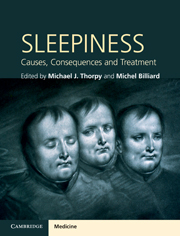Book contents
- Sleepiness
- Sleepiness
- Copyright page
- Contents
- Contributors
- Foreword
- Preface
- Abbreviations
- Section 1 Introduction
- Chapter 1 Epidemiologyof excessive sleepiness
- Chapter 2 Neurochemistryof excessive sleepiness
- Chapter 3 Functionalneuroimaging of disorders of sleepiness
- Chapter 4 Clinical evaluation of the patient with excessive sleepiness
- Chapter 5 Objective measures of sleepiness
- Chapter 6 Subjective measures of sleepiness
- Chapter 7 Cognitive effects of sleepiness
- Chapter 8 Motor vehicle driving and excessive sleepiness
- Chapter 9 Medico-legal consequences of excessive sleepiness
- Section 2 Sleep Disorders and Excessive Sleepiness
- Section 3 Medical, Psychiatric and Neurological Causes Of Sleepiness
- Section 4 Therapy of Excessive Sleepiness
- Index
Chapter 1 - Epidemiologyof excessive sleepiness
from Section 1 - Introduction
Published online by Cambridge University Press: 04 February 2011
- Sleepiness
- Sleepiness
- Copyright page
- Contents
- Contributors
- Foreword
- Preface
- Abbreviations
- Section 1 Introduction
- Chapter 1 Epidemiologyof excessive sleepiness
- Chapter 2 Neurochemistryof excessive sleepiness
- Chapter 3 Functionalneuroimaging of disorders of sleepiness
- Chapter 4 Clinical evaluation of the patient with excessive sleepiness
- Chapter 5 Objective measures of sleepiness
- Chapter 6 Subjective measures of sleepiness
- Chapter 7 Cognitive effects of sleepiness
- Chapter 8 Motor vehicle driving and excessive sleepiness
- Chapter 9 Medico-legal consequences of excessive sleepiness
- Section 2 Sleep Disorders and Excessive Sleepiness
- Section 3 Medical, Psychiatric and Neurological Causes Of Sleepiness
- Section 4 Therapy of Excessive Sleepiness
- Index
Summary
- Type
- Chapter
- Information
- SleepinessCauses, Consequences and Treatment, pp. 3 - 13Publisher: Cambridge University PressPrint publication year: 2011
- 1
- Cited by



